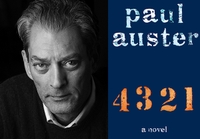4 3 2 1
Paul Auster. Holt, $32 (880p) ISBN 978-1-62779-446-6
Almost everything about Auster’s new novel is big. The sentences are long and sinuous; the paragraphs are huge, often running more than a page; and the book comes in at nearly 900 pages. In its telling, however, the book is far from epic, though it is satisfyingly rich in detail. It’s a bildungsroman spanning protagonist Archie Ferguson’s birth in 1947 to a consequential U.S. presidential election in 1974. Some warm opening pages are dedicated to the romance of the parents of Ferguson (as the third-person narrator refers to him throughout), Rose and Stanley. In its depiction of the everyday life of its hero, the book also gives a full history of America during this period through the eyes of Ferguson who, not coincidentally, is roughly the same age as Auster. He roots for the nascent Kennedy administration, sees Martin Luther King’s peaceful resistance, and recognizes both the greatness and the iniquity in L.B.J.’s actions as president. These national events are juxtaposed against Ferguson’s coming-of-age: he goes to summer camp, has a sad first love with a girl named Anne-Marie, and gets an education via his beloved aunt Mildred. One of the many pleasures of the book is Ferguson’s vibrant recounting of his reading experiences, such as Emma Goldman’s Living My Life, Voltaire’s Candide, and Theodore White’s The Making of the President, 1960. Auster adds a significant and immersive entry to a genre that stretches back centuries and includes Augie March and Tristram Shandy. (Jan.)
Details
Reviewed on: 09/26/2016
Genre: Fiction
MP3 CD - 978-1-4272-8278-1
Open Ebook - 1104 pages - 978-1-62779-447-3
Paperback - 992 pages - 978-1-250-61880-1



